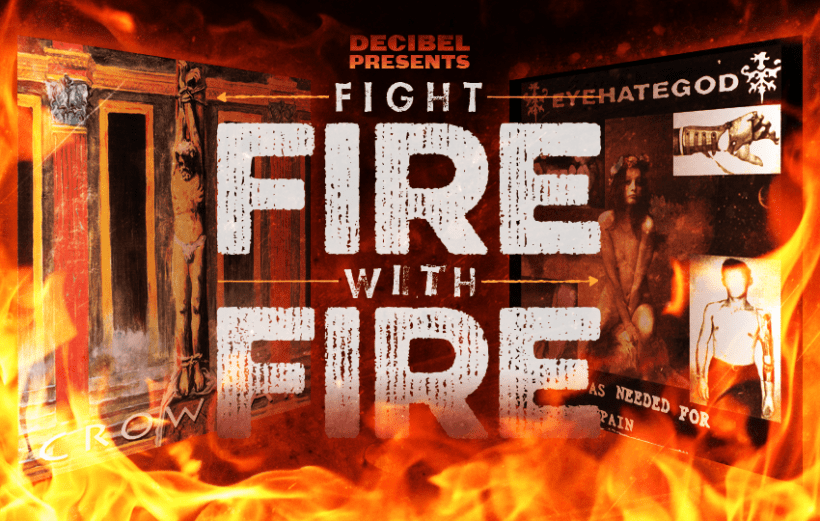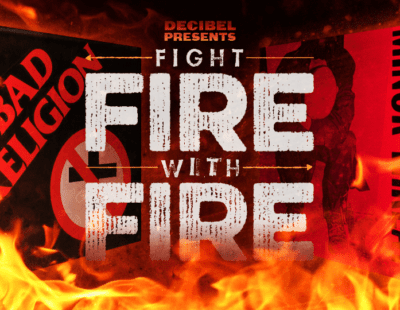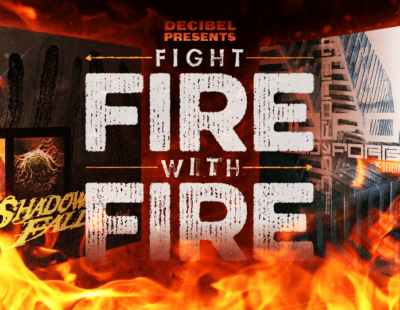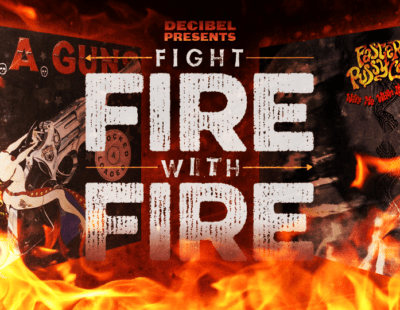
Fight Fire With Fire is an ongoing series on our site where we pit two classic genre albums against each other to definitively figure out which one is better. “But they’re both great!” you’ll say. Yes, these albums are the best of the best. But one is always better. Plus, we love these sorts of exercises, and also love watching you battle each other to the death in the comments, so how could this possibly end poorly?
It wasn’t until I was pitching this to my editor that I really connected the dots between these two albums. Both are from NOLA sludge legends, both are the bands’ second records, both are from 1993, both are when the band in question really came into their own. They’re both massive statements of intent that laid down the groundwork for what the groups would do over the ensuing decades. It’s not uncommon for a band to really develop their sound fully on their second record (buy me a beer and I can talk about this happening at length in the hair-metal scene), and that’s exactly what happened with Crowbar‘s self-titled record and Eyehategod‘s Take as Needed for Pain.
But which one is the ultimate early-NOLA sludge masterpiece? Find out in today’s misery-loving, feedback-drenched, swamp-dwelling sludge edition of Fight Fire With Fire.
Crowbar – Crowbar
The opening riffs of lead cut and Crowbar classic “High Rate Extinction” set the mood right away here, the band managing to be outrageously heavy while also hitting all the feels. And that’s what Crowbar do best, and while their debut album—1991’s Obedience Thru Suffering—was massive and impressive, it wasn’t quite the actualization of what Crowbar was capable of. But this album is.
And while this band has had several stellar lineups, it’s hard to find any fault with this one, these four guys absolutely locked in to each other here, musically and, if I may, vibe-wise. I mean, check out ultra-classic “All I Had (I Gave)”: it’s uncharacteristically speedy but sacrifices little of the massive Crowbar power, and when things get slower in the chorus, it’s huge. When the breakdown drops at 1:53, forget it. This song is memorable, moving, and crushes like a ton of bricks.
“Will That Never Dies” drops things down for another soulful journey through the murk, mainman Kirk Windstein doing everything he does so well: mountain-crushing riffs, vocals pulled from the depths of despair, a love of rockin’ out hidden underneath it all.
I generally don’t care too much about covers, but the band’s version of Led Zeppelin’s “No Quarter” totally rules, taking the song’s original bad-acid atmosphere and sludging it down appropriately. Windstein’s vocals work perfect here, as do the crushing drumming and huge riffing. The chord changes before the chorus comes could swallow planets.
“Negative Pollution” is actually a late-album classic of sorts, killer vocal lines, great playing, good songwriting, masterful use of sludge and sludgier tempos. “Existence Is Punishment” is another one that hits hard late here, excellent mastery of song, no shortage of emotion seeping out of every slug riff.
“Holding Nothing,” man, in going through this album song by song with a fine tooth comb, I’m realizing something, and this song is another great example of it: Crowbar, even way back in 1993, had the art of songcraft down to a very fine point. They would get even finer (hi, “Planets Collide,” good goddamn are you maybe the best sludge song ever) but this album is just song after song of great, well, song after song. This one proves it, so does the masterful closing cut.
“I Have Failed” ends things off perfectly, and is one of the greatest monuments to sludge ever crafted. It captures the despondent feeling that this music should perfectly, it moves along at an agonizing pace, and the vocals are so honest they hurt to listen to. Pretty bold saving this one for last, although it wouldn’t really make sense elsewhere else on the album, because when it’s done, if you’ve really given yourself over to it, you’re done. Incredible.
Throughout this whole album—throughout every song—the drumming of Craig Nunenmacher is just incredible. The man is a powerhouse, hitting the open hi-hat and toms with an unbelievable amount of force, and the production—courtesy of Phil Anselmo—rules, bringing out every instrument perfectly, especially the drums. Seriously, Nunenmacher just propels this album along, his work here something to be documented and studied for future generations of how sludge drumming should be. Amazing.
This album is phenomenal, great songwriting buried in sludge perfection, heavy music as pure emotion, nothing short of genuine art. Every second of this record feels perfect, a stark comparison, really, to Take as Needed for Pain, which is falling apart the seams, an ugly mess compared to Crowbar’s economic craft. But how does EHG’s sonic embodiment of chaos compare to Crowbar’s perfect distillation of misery?
Eyehategod – Take as Needed for Pain
Man, Eyehategod’s debut—1990’s In the Name of Suffering—is one dark, difficult album, so much so that I rarely spin it. Sludge needs to be antagonistic and ugly, but that album just feels like it hates me, it feels unwelcome. Here though, on their second album, Eyehategod found that sweet, sweet spot and although every record they do is fantastic, this one remains their masterpiece.
As evidence of this, opener “Blank” is without a doubt one of the best sludge songs ever. The feedback, that first riff, the first scream: totally iconic. This song is almost always stuck in my head, and it immediately stepped the band up from the Melvins-but-way-pricklier sewers of their first album to somewhere that, thanks to the feelgood-just-fucking-kidding-you-feel-baaad southern riffing, connects, and is memorable. When the band slow things down and come in together at slug pace at 1:18, again, man, this was history, and history never sounded so heavy unless we’re talking song one side one Black fucking Sabbath. Amazing how this riff makes you feel, and then when Mike Williams comes in with the vocals and things get even slower… then the riff that comes in at 3:37, elevating this to a higher level of sludge that no one else has reached ever since… it’s just perfect, then even more perfect, then even more perfect. Amazing. I mean, no exaggeration, this is maybe the heaviest riff I’ve heard in my life. Then the legendary “suffering from addiction to drugs” samples, the pounding and bashing drumming… This album could end after this song and I would still hold it up in incredibly high regard. Complete perfection.
But it doesn’t end there; the beautiful torture is only beginning, guitarists Jimmy Bower and Brian Patton working together and apart so well on this record, amazing riff after amazing riff just flowing out of the pair.
The second song, the adorably titled “Sister Fucker (Part 1),” has THE riff. The band manage to pick up the tempo here to create what could, in some alternate, wonderful reality, be considered a good-time song, even though it’s pure sludge ugliness. But, man, impossible to not get the, uh, booty shaking to this one, that riff just unbelievable, the band locked together as well as they possibly could be at this point, which, despite the haze of the life they were living at the time, is remarkably well.
The groan at 1:37 of “Shop Lift”; the totally indecipherable first line at 0:25 of, well, let’s call it “White Neighbour” like Apple Music does (lol); the entirety of batshit bonkers 7:01 noise interlude “Disturbance”… This album feels less like a bunch of incredibly well-crafted songs, like Crowbar’s record is, and more like one big mash of atmosphere and nastiness. And that works, that’s exactly what this record is, even incredible songs like “Blank” sort of merging together with other songs here in my head, or being split up into a couple songs (it is a long one), everything just working together to create something horrid, something new, something not really borrowed, something very blue.
Then there’s the title track, which is a huge slap in the face after “Disturbance” lulled us all off to a sort of temporary quiet zone. The grotesque opening line of “Breastfed from a dog from the day I was born” barely prepares us for the beatings that ensue.
And the beatings go on, powerhouse drummer Joey Lacaze (RIP) absolutely destroying on “Crimes Against Skin,” while the band as a whole show some songwriting smarts on late-album smasher “Kill Your Boss.”
And, of course, the maniacal rant of a closer “Who Gave Her the Roses” and final soundscape “Laugh It Off” end things off with a couple tracks that aren’t really traditional songs in a lot of senses, instead just layers upon layers of manic frustration, of danger-zone cautionary tales set to music, 99 more miles of bad road laid down as parts of a glorious, depraved whole.
——-
This fight was a bit more bruised apples and rotten oranges than I thought it would be, really. Sure, it’s a showdown between NOLA sludge titans, but these records are very different strains of sludge, despite the sonic and philosophical similarities. Still, one record does rise up with its stench, its manifestation of total terror, its truly despicable demeanor. Today, we crown Eyehategod’s Take as Needed for Pain as the unlikely and unwilling and unwitting and it just doesn’t fucking care winner, these songs taking the listener to a dangerous place every single time, Williams’ wretched screams the hungover ellipses over Lacaze’s physical acts of violence behind the kit, drumming that’s more than drumming, music that’s really more than music, the record a savage, ugly, grotesque masterpiece, art holding up the broken mirror to society then smashing it and doing unspeakable things with the shards, an uncomfortable monument to honesty through creativity. May its feedback ring through the ages forever more.




